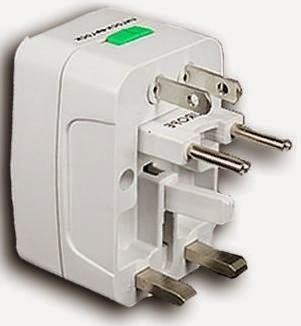There are some important steps to take in preparation for travel to a foreign country. I travel regularly in and out of other countries, and I've found that these 10 steps help me to be properly prepared for anything. If it can go wrong, it probably will go wrong during travel, so be ready for anything. Make sure you write down important information with pen and paper. Don't reply on a flash drive or other technology to always work. Nothing beats pen and paper.
1 - Email travel documents to yourself, including your passport. Keep a printed copy of your hotel reservation, airline tickets, and similar documents. However, you should also email this information to yourself. If it gets lost, you can run to a net-cafe and retrieve the information again. In case it is lost or stolen, scan the important pages of your passport into your PC and mail them to yourself. It won't replace your lost passport, but the printed copy will allow you to check into a hotel while your passport is being replaced. This also makes it easier at the US embassy when you go to request the replacement.
2 - Print a map of your destination hotel and area, and make a note of alternate hotels in the area. You never know what mishap may occur. Either your reservation is lost, or maybe the hotel is just not suitable. Have a second hotel choice in mind. Also print the map in the local language, in case you need to show it to a taxi driver.
3 - Find the US Embassy on a map and note the local phone number to its offices. In case of an emergency, you want these numbers to be handy. Most US embassies are less than helpful, but it's good to at least have their information.
4 - Look up the average currency exchange rate. On the day of a trip to Europe, if the average rate of the Euro is 1.2950 that day vs. the USD, then you'll be able to avoid the exchange counters offering 1.2500 (and these overpriced exchange services do exist). You won't get the actual interbank rate anywhere, but you can at least look for rates closer to 1.2915 - 1.2940 or near.
5 - Look up Visa information. See if your destination country needs you to get a visa, or if you get a "visa on arrival" stamp when you land. How many days will this get you? Some countries only give you a 14 days stamp. If your vacation is 20 days, then you'll need to get a tourist visa for the extra days, or pop into another country for a few days. Either way, look into the information.
6 - Have 2 (or even 3) ATM cards in your possession. This may mean opening an extra bank account, but do it. Trust me, you can never have enough ATM cards during travel. Invariably at least one will get eaten by a foreign ATM. You will need back-up cards to access your cash. I carry 4 ATM cards that access a variety of checking and savings accounts back in the US. You can never be too prepared. While ATM machines exist all over the world, not all merchants accept credit or debit cards, and almost no one accepts Discover or American Express outside the US.
7 - Do you take any medicines? If you do, look into hospitals or pharmacies near your hotel. Be prepared to get a replacement for your medicine, if it's lost or stolen. Bring both your medicine and your prescription.
8 - Contact your banks and let them know you'll be traveling and using your credit and debit cards in another country. This will prevent them from canceling your card. On one of my trips to Singapore, the bank panicked after I made a purchase. They tried to call me or reach me by email, but I was sleeping (due to the 12 hour time difference). After a few hours, they canceled my card. This meant my card was useless for the rest of the trip. They offered to Fed Ex a new card within 3 days, but I was returning in four. Just make sure you alert them before you leave for you trip.
 9 - Check the voltage requirement in your travel country. Many use 220 instead of 110. Make sure your electric hairdryer won't blow a circuit at the hotel. Most PC notebooks can switch between the two, so you can plug in your computer almost anywhere on the globe. However, nothing else will switch for you. You'll need special adapters.
9 - Check the voltage requirement in your travel country. Many use 220 instead of 110. Make sure your electric hairdryer won't blow a circuit at the hotel. Most PC notebooks can switch between the two, so you can plug in your computer almost anywhere on the globe. However, nothing else will switch for you. You'll need special adapters.10 - Open a Skype, Yahoo Voice, or other pc voice account, if you don't already have one. This will make life easier for you, if you need to contact anyone back home. If you need to call the bank, for example, it's a lot easier on Skype than on a $2 per minute calling card. Your cell phone won't work, unless it's geared for all regions, and even then it's expensive.
Also check on any vaccination requirements. These only exist in a few countries, but do make sure to check on this to be sure.
Also check out:
The key to remember is to be prepared for everything to go wrong. When you're thousands of miles from home, you need extra measures of protection. On some trips, everything goes smoothly, but when things do go awry, don't get caught unprepared. Get all these things ready before you travel abroad.



No comments:
Post a Comment